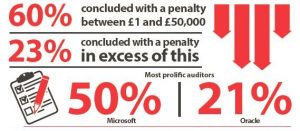Why The Customer Is Always Wrong (In Software License Reviews)
Given the massive shift the IT world is currently experiencing towards more service-focused delivery of all compute resources, it should come as no surprise to find money and profitability channels being openly analysed at this time. Among the sensitivity points today we see that software license reviews have become a standard method of income generation for the major software vendors, according to a new report by Cerno.
Cloud not profitable, enough
With cloud revenues still only at 6% for vendors such as Oracle, SAP and Microsoft but with new license business falling, there is one obvious remedy: initiating a major push on maximising income from the existing customer base.
Cerno insists that the exercise of contractual rights to license reviews is a way in to uncover any under-licensing – and then recover additional license fees and increased support and maintenance.
The report suggests that 40 % of local authorities and 28% of universities that disclosed information confirmed they had been audited in a 20 month period with only one third confirming that they were adequately licensed.
NOTE: Penalties were less than £50,000 in most cases but in two instances, still exceeded £250,000 after negotiation.
An impossible challenge: license ambiguity
Robin Fry of Cerno has said that existing users, however diligent, are a ready target. ”Software vendors know very well that full compliance is an impossible challenge because of ambiguity in license agreements, differing interpretations of the effect of virtualisation and continuing issue of new policies and guidelines. Any license review is bound to deliver free cash”.
For the public sector the situation is often worse because of the need to maintain uninterrupted services to a wide user base – students, tenants, rate payers and other users of council services – combined with a responsibility that is often very public.
Faced with the findings of a license review based on hopelessly opaque licensing rules, many simply pay up fearful of their core services being cut off or being found out as infringers,’ Fry said.
Fry added that the actions of the major software vendors demonstrate that they have little trust in their users and are determined to extract all they can from public sector organisations that often have little opportunity to source their database technology and applications elsewhere.
Vendor-customer view: untrusted partners
The suggestion here is that these organisations need to realise that, despite many years of apparently good relations with their vendor, they are untrusted partners. If they have not been audited in the last two years, it’s clear that there is a license review waiting round the corner which in most cases will result in unbudgeted penalty demands.
Fry finishes up by going for the jugular saying, “IT managers need to place as much confidence in their software vendor relationship as they would if they turned up late for a Ryanair flight with their granny carrying an extra suitcase. Software vendors have a new guiding principle: the customer is always wrong.”
ITAM Review Analysis
Founder of The ITAM Review Martin Thompson says that this report highlights the trend in modern day software audits: a cash cow to prop up flagging software publishers.
Thompson warns that as license programs get ever more complex, the organisers of the The Campaign for Clear Licensing (CCL) urge European legislators to carefully consider this market behavior from the likes of Microsoft, IBM, SAP and Oracle, especially when it is directly hitting taxpayer’s money.
“It is immoral to prey on underfunded local authorities and Universities for quick cash to prop up sales targets. It should also be outlawed to sell a license program when the measurement of consumption has not been defined. Many audits manage to generate cash because the victim has no idea how their licensing is actually measured or managed,” said Thompson.
Similarly he says, local councils and universities need to wake up to the “significant management overhead” of managing complex licensing.
The final word from the ITAM Review
A framework agreement or campus agreement is not a shield of steel against audits, organisations need to invest in managing software as an asset or face the surprise of un-budgeted settlements.

